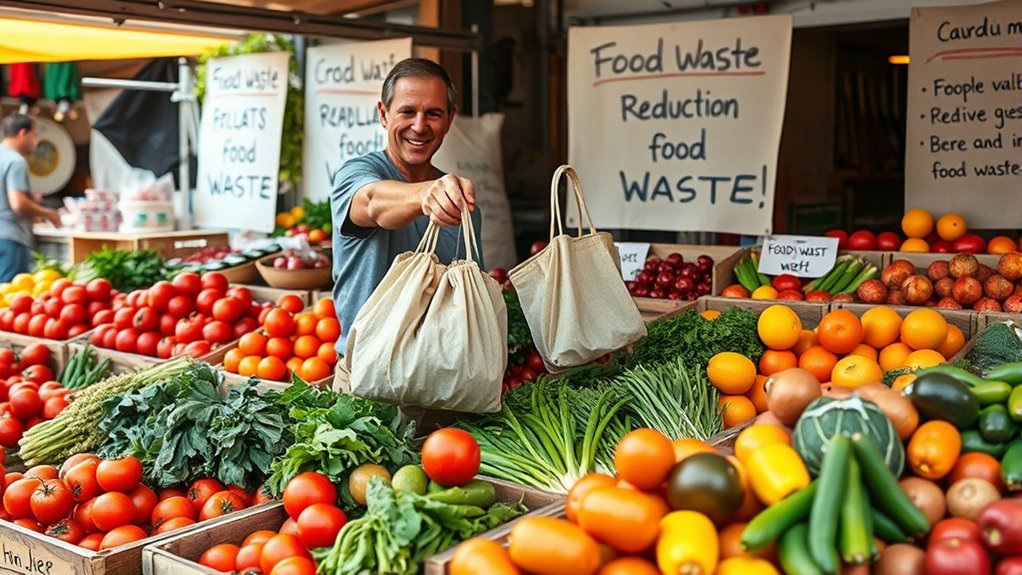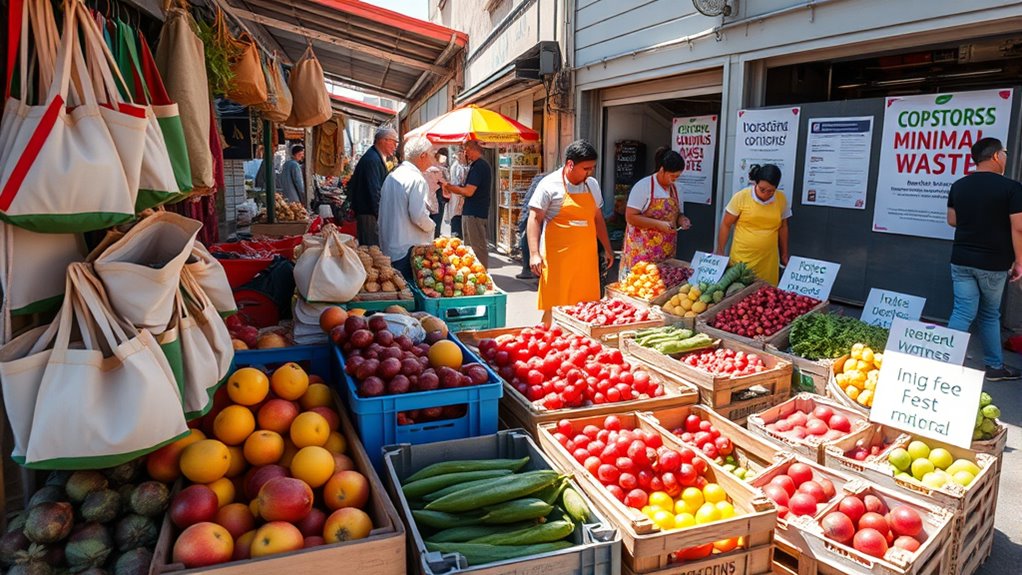Around the world, reducing food waste involves raising awareness through campaigns, improving food labels to prevent confusion, and supporting food redistribution efforts like food banks. Farmers and businesses are adopting innovative practices to manage surplus and promote imperfect produce. At home, you can cut waste by planning meals, storing food properly, and using smart technology. Keep exploring—there are more effective strategies to help you make a real difference.
Key Takeaways
- Implementing awareness campaigns and educational programs to promote responsible consumption and proper food storage.
- Reforms in food labeling, clarifying expiration dates to prevent premature disposal.
- Supporting food redistribution networks like food banks to redirect surplus food to those in need.
- Promoting the use of imperfect produce and innovative farming practices to reduce agricultural waste.
- Encouraging household practices and technological tools such as meal planning and smart appliances to minimize daily waste.

Reducing food waste is essential for creating a more sustainable and efficient food system. Every year, millions of tons of food go to landfill, wasting not only resources but also contributing to environmental problems like greenhouse gas emissions. By adopting effective strategies, you can help minimize waste and support global efforts to create a greener future.
Reducing food waste helps create a sustainable, eco-friendly food system for a greener future.
Across the world, countries implement diverse approaches, often tailored to their unique cultural, economic, and infrastructural contexts.
In many places, awareness campaigns serve as the first step toward change. Governments, NGOs, and community groups run educational programs that inform people about the impacts of food waste and practical ways to reduce it. When you understand how your habits contribute to waste, you’re more likely to make conscious choices, like buying only what you need or properly storing leftovers.
Some countries also promote labeling reforms, making expiration dates clearer to prevent premature disposal of food that’s still safe to eat. This helps you avoid unnecessary waste caused by confusion over labels like “best before” and “use by.”
Food redistribution programs play a vital role in reducing waste, especially in regions where surplus food is abundant but not always reaching those in need. Food banks and charities collect edible, unsold food from supermarkets, restaurants, and farms, redirecting it to communities facing hunger. If you’re involved or supporting such initiatives, you contribute directly to reducing waste and helping vulnerable populations.
Many cities have implemented apps or platforms that connect consumers with surplus food from local vendors at discounted prices, making it easier for you to buy high-quality food that might otherwise be discarded.
In the agricultural sector, innovative practices are being adopted to minimize loss at the source. Farmers are encouraged to harvest only what they need and to use imperfect produce in processed foods or for other purposes.
You can support these efforts by purchasing “imperfect” fruits and vegetables, which are just as nutritious but often more affordable.
Meanwhile, in households, adopting meal planning, proper storage, and portion control can markedly cut down on waste. Freezing leftovers, repurposing ingredients, and being mindful of expiry dates are simple yet effective habits you can practice daily.
Technological solutions are also gaining ground, such as smart refrigerators that monitor food freshness or apps that help you plan meals and track inventory.
Governments and companies worldwide are investing in these innovations to make waste reduction easier and more accessible. By embracing these tools and strategies, you become an active participant in a global movement to minimize food waste, conserve resources, and protect the environment.
Every small action counts, and collectively, they can lead to a considerable positive impact on the planet. Additionally, understanding the importance of food storage techniques can significantly help in extending the shelf life of perishable items, further reducing waste.
Frequently Asked Questions
How Do Cultural Attitudes Influence Food Waste Practices Globally?
Cultural attitudes shape how people view food waste and influence their habits. You might find that in some cultures, wasting food is seen as disrespectful or irresponsible, leading to careful consumption.
In others, surplus might be celebrated or shared, reducing waste. Your behaviors are affected by traditions, beliefs, and social norms, which can either promote mindful eating or foster excess.
Changing these attitudes can profoundly decrease food waste globally.
What Role Do Technology Innovations Play in Reducing Food Waste?
Oh, sure, technology’s here to save the day—just like those fancy apps that track your groceries or smart fridges that tell you what’s about to spoil.
You get real-time updates, automate waste management, and even connect with local food banks.
Basically, tech makes it easy for you to pretend you’re eco-friendly while secretly just tossing less food.
It’s the modern miracle—if only it worked on all of us!
Are There Economic Benefits for Countries Implementing Waste Reduction Strategies?
You’ll find that implementing waste reduction strategies can bring significant economic benefits. By reducing food waste, you lower costs related to production, transportation, and disposal.
Additionally, less waste means more efficient resource use, which boosts profitability for businesses.
Countries that adopt these strategies often see increased savings, improved food security, and a stronger economy.
How Do Food Waste Policies Impact Small-Scale Farmers Differently?
You’ll find that food waste policies can affect small-scale farmers differently. These policies might create new opportunities, like access to markets or support programs, helping them reduce waste and increase income.
However, they can also pose challenges, such as increased compliance costs or restrictions that may be harder for small farmers to meet. Overall, thoughtful policies can empower small farmers, but they need to be designed with their unique needs in mind.
What Are Successful Examples of Community-Led Food Waste Initiatives Worldwide?
Imagine a community turning scraps into treasure—that’s the power of local food waste initiatives. Around the world, successful programs like France’s “Food Rescue” network, Spain’s “Food Bank,” and South Korea’s “Food Waste Recycling” show how communities can lead change.
These efforts mobilize volunteers, partner with businesses, and educate residents, proving that collective action can transform waste into resources and reduce environmental impact.
Conclusion
So, after exploring all these clever food waste reduction strategies around the world, it’s funny how the biggest waste often comes from simply ignoring what’s on your plate. You might think tossing out leftovers is harmless, but it’s ironically the biggest waste of all. Maybe next time, instead of wasting, you’ll see those imperfect fruits and veggies as treasures, not trash. After all, in the fight against food waste, the real hero is just a fork away.









